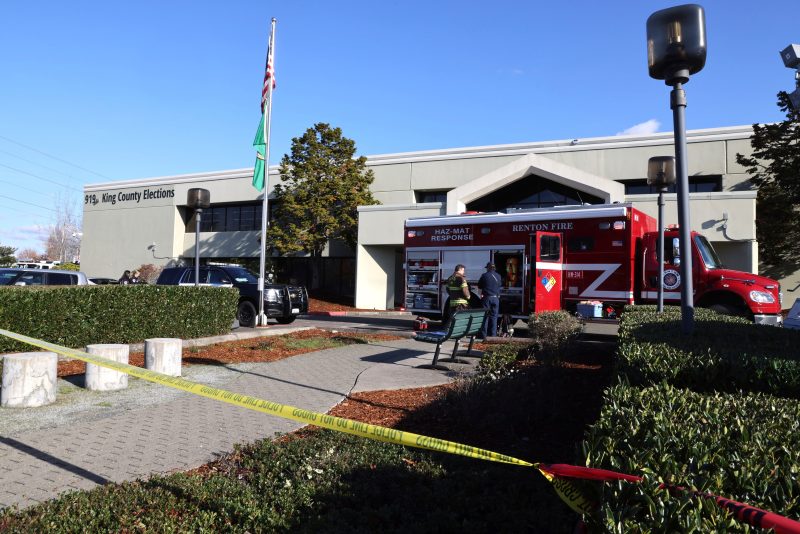
Suspicious letters sent to elections offices in at least five states
Authorities in at least five states were Thursday night investigating suspicious letters mailed to election offices. The letters, at least one of which contained fentanyl, forced evacuations and in some cases temporarily disrupted ballot counting after Tuesday’s elections.
Secretaries of state in Nevada, California, Washington state, Georgia and Oregon all confirmed that election offices in their states had received the letters and said law enforcement, including the FBI, is investigating the matter.
The FBI confirmed in a statement that the agency, “along with our law enforcement partners, responded to multiple incidents involving suspicious letters sent to ballot counting centers in several states.”
The letters add to the challenges facing election workers, who have been besieged by threats and harassment in recent years. At a news conference Thursday, Georgia Secretary of State Brad Raffensperger (R) confirmed that his office was alerted Wednesday to a letter containing fentanyl that was sent to election offices in Fulton County, Ga.
Raffensperger, who lost his son to a fentanyl overdose five years ago, called the incident “domestic terrorism.” He added in a statement that his office is “working with our state and federal partners to determine if any additional Georgia officials are being targeted.”
Both Raffensperger and Fulton County have been the subject of former president Donald Trump’s ire in the wake of the 2020 presidential election. Raffensperger refused Trump’s demand to “find” enough votes in the state to overturn his defeat. And Trump faces federal charges brought in Fulton County alleging he participated in a criminal conspiracy to illegally overturn his 2020 loss. Trump has pleaded not guilty to the charges.
Medical experts have said simply touching fentanyl is not enough to trigger an overdose. But fentanyl can still be deadly if it gets into a person’s system.
The drug is 50 to 100 times as lethal as heroin, making it a grave threat if ingested. And a little bit can go a long way, worrying authorities who have warned of the potential use of fentanyl as a weapon.
The envelope’s contents in at least one instance included a page that said “END ELECTIONS NOW” along with images of a progress Pride flag, a pentagram and an anti-fascist symbol. The message also warned the recipient to “STOP GIVING POWER TO THE RIGHT THAT THEY DON’T HAVE,” saying, “WE ARE IN CHARGE NOW AND THERE IS NO MORE NEED FOR THEM.”
Authorities have not named any suspects, and while the symbols in the letter are associated with left-leaning politics, the political leanings of the sender or senders remain unclear.
California Secretary of State Shirley Weber (D) confirmed Thursday that two suspicious envelopes on their way to election facilities in Los Angeles and San Francisco were intercepted by the U.S. Postal Service.
Weber clarified that “there has been no confirmation that these envelopes contained any toxic substances,” but she said she is “advising local election offices to take precautions before handling mail that arrives at their facilities.”
The Nevada secretary of state’s office also said in a statement Thursday that “federal authorities alerted Nevada authorities of suspicious letters addressed to elections offices in multiple states, including Nevada.”
The Washington secretary of state’s office said in a press release that envelopes containing “unknown powdery substances” were received by elections offices in King, Pierce, Skagit and Spokane counties. Elections workers in each county evacuated their offices. The incidents occurred while workers were processing ballots from Tuesday’s elections.
Washington Secretary of State Steve Hobbs (D) called the incidents “acts of terrorism to threaten our elections.”
In Pierce County, which includes Tacoma, a worker was opening mail Wednesday morning when she noticed it contained white powder, said Linda Farmer, the county auditor. The worker removed her glove, told her boss, and the building was evacuated, Farmer said.
“We’re a bit shaken up, and it’s clear that bad actors are out there trying to derail democracy. But we didn’t take this lying down,” she told The Washington Post. “We were out of commission for about two-and-a-half hours.”
Vote counting was paused, but staff returned and continued to open ballots, Farmer said.
“We came in early, and we are staying a little bit late tonight to get as many ballots counted as humanly possible,” she added.
Farmer said that she was told by law enforcement officials who field tested the substance that “it came back positive for baking soda.”
In Oregon, the secretary of state’s office confirmed that Lane County received a suspicious letter Wednesday. Laura Kerns, communications director for Oregon’s secretary of state’s office, said the state’s “elections offices have appropriate protocols in place and this incident will not impact the completion of the election.”
Threats of violence, doxing and harassment have contributed to high levels of turnover in election offices around the nation since the 2020 election, said Michael Beckel, research director for Issue One, a nonpartisan group that represents election officials. The group recently released a report that found that since the 2020 election, nearly 40 percent of chief local election officials in 11 western states are new to the job.
“We know that this is still a heightened environment,” Beckel said. “When you’re getting unknown substances in the mail, that’s an added stressor.”
David Becker, an election expert who heads the nonprofit Center for Election Innovation & Research and speaks frequently about the harassment and threats experienced by election workers, said the envelopes are just the most recent example of the hostility some workers have faced over the past three years, since Trump’s 2020 loss.
“This isn’t anything new — this is just a different tactic,” he said. “It just represents the difficulty election officials have.”
Meryl Kornfield and Devlin Barrett contributed to this report.
